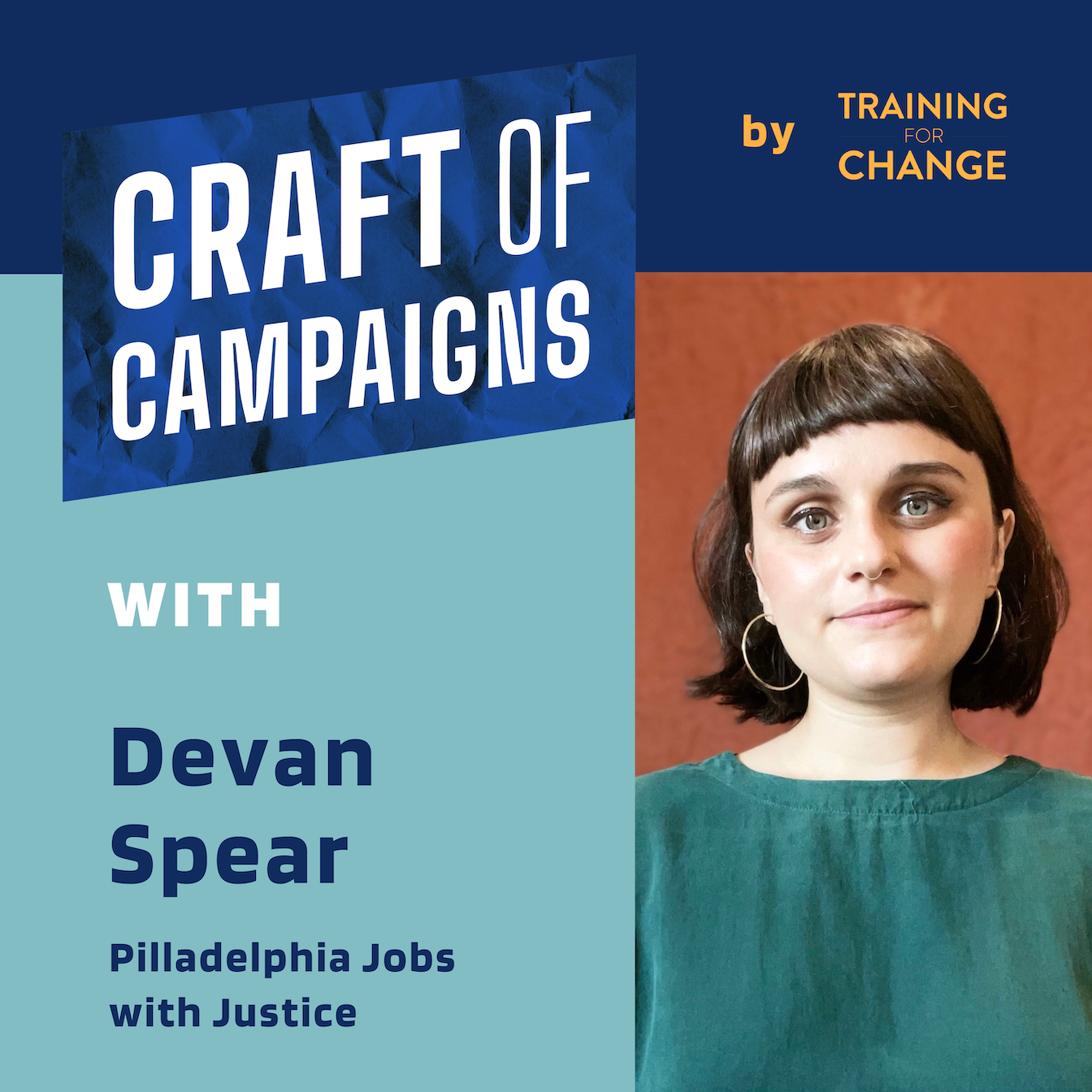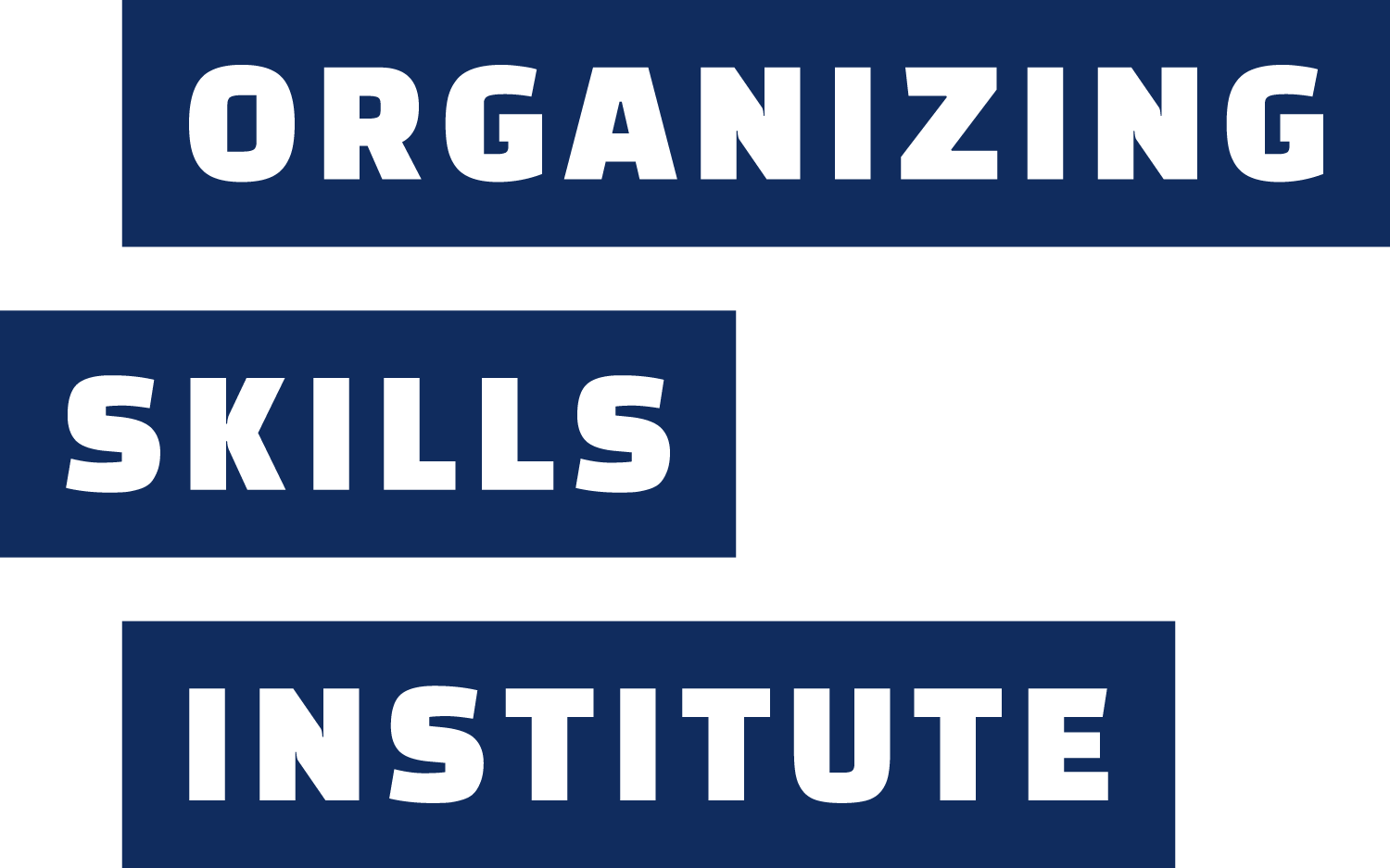S2E3: Devan Spear on forcing universities to pay their fair share
March 26, 2024
Episode Guest
Devan Spear joined Philadelphia Jobs With Justice as director in 2017. Under her leadership, Philly JWJ collaborated with the National Domestic Workers Alliance to launch the NDWA-PA chapter, won a $100 million commitment from UPenn to remediate lead and asbestos in public schools, and launched a new campaign for safety protections for Philadelphia warehouse workers. Devan is the communications vice president for the Philadelphia Coalition of Labor Union Women and a member of the PhilaPOSH board of directors.
Dusting off a seven-year-old demand to win millions for Philly’s public schools
By Andrew Willis Garcés, also published on The Forge
Imagine you’re the new leader of a small organization – with a paid staff of exactly one person – and you’ve decided to kick off a campaign to mobilize teams of volunteers to take on some of the most powerful institutions in the country’s sixth-largest city. To raise the level of difficulty, imagine yours is a labor organization, and this campaign, for public school funding, has to deeply engage dozens of activists who aren’t parents, current students, or school employees. And it will launch publicly in February 2020 – a few weeks before the pandemic-induced lockdown.
Sounds like a walk in the park, right?
You’ll read the story of that organizational leader, Devan Spear, Philly Jobs with Justice, and how they expanded an education campaign past the usual suspects by building on previous wins and movements, in a minute. First, I want to share why the Craft of Campaigns team found this story so compelling.
We think this campaign speaks to many of us because so much local organizing is ultimately about how to raise and spend public dollars. Whether we’re campaigning for local wage theft ordinances, renter protections or language access ordinances – all of which require hiring local staff to enforce and implement – our challenge as campaigners is often to create more funding for our priorities. When it comes to public schools – which are perennially under-resourced – it can be difficult to know what to fight for first. The organizers identified a winnable demand that would make a meaningful impact on public school finances – not everything they wanted, but a significant, permanent new funding source – and framed it not as an education issue, but as an urgent, lifesaving measure, given the lead pipes that were literally sickening the city’s school children, who were overwhelmingly Black and brown.
The demand was for Philly’s largest tax-exempt institutions, who control a huge part of the real estate that would otherwise be used to pay for public schools, to contribute 40% of what they would have paid in taxes, in voluntary payments to help the public school system eliminate lead and asbestos sickening children from all school buildings. That would amount to over $75 million a year.
It also feels important, because sometimes the unanticipated, sudden end of one campaign can set the stage for the next. A friend of mine once referred to this as the “oh-shit-we-won” problem. The organizers of the campaign preceding this one, which fought to win back local control of the school system, succeeded more quickly than anticipated. They had to figure out where to go next, and fighting to get the largest universities to pay more in taxes wasn’t the obvious next move.
Sometimes, the next move requires revisiting old demands, or a constituency you haven’t thought about for a while. The somewhat nerdy but hugely impactful demand at the center of this campaign spoke deeply to a small constituency: University of Pennsylvania staff, students and alumni who wanted to be recruited, eight years after this same campaign demand had first inspired direct actions targeting the university’s president.
This story also shows the importance of slowly and diligently building campaign structures and containers. A few months after launching, JwJ found themselves in a whirlwind moment during the pandemic summer of 2020, with thousands of Philadelphians newly activated around racial justice demands. The campaign responded with distributed volunteer-led leadership teams that were able to quickly absorb new members.
And this campaign calls back to our second episode this season, when a union organizing janitors who cleaned downtown office buildings realized they needed to make their fight also about underfunding public schools, broadening a workplace campaign into a broader fight. More and more, framing one relatively simple campaign demand as an issue relevant for multiple constituencies seems like a winning formula for nearly any political geography.
Backstory
In 2001, Pennsylvania Governor Mark Schweiker took control of the city’s public schools, ostensibly because too few students were mastering reading and math skills, replacing the elected school board with an appointed body called the School Reform Commission. This became central to many fights around the city’s schools over the next fifteen years.
One of the fights was around taxes. When public school supporters demanded more funding, elected officials would say, “we don’t have more to give.” And sometimes they would point out that much of the highest-value land was exempt from property taxes, as it was controlled by tax-exempt institutions – universities and hospitals. Penn alone owns over $3.2 billion in tax-exempt property. Public schools are funded by property taxes, but the biggest landowners are nonprofit universities and hospitals who are exempt from those taxes – leading to severely underfunded public schools. When the city briefly had the power to revoke an institution’s tax-exempt status, in the mid-90s, forty large nonprofits contributed $9 million a year in what were optional, or voluntary payments – called “payments in lieu of taxes,” or PILOTs as the acronym goes. But by 2011, after the state took away the city’s regulatory power, the donations trickled down to just $300,000 annually.
So in 2012, University of Pennsylvania students, journalists, and a few local labor unions reignited the issue of universities not paying their “fair share” for public services. A few one-off protests drew attention, but no campaign emerged for mandatory payments.
In the years that followed, the local public schools’ organizing ecosystem – which included student organizers, basebuilding hubs like the 215 People’s Alliance, the Movement Alliance Project, the Caucus of Working Educators, and Philadelphia Jobs with Justice – launched a shared campaign in 2016 to end state control of the city’s schools and abolish the so-called School Reform Commission that had instigated massive school closures. Jobs with Justice and its member organizations were clear about their stake in the fight: public school conditions are also working conditions, and working people need high-quality, safe public schools. The Our City Our Schools Campaign achieved its goal more quickly than many in leadership had anticipated; they won key endorsements and a final victory all within the last three months of 2017.
As Devan recounts in this interview, some campaign members followed that unexpected win by exploring demands to raise revenue for public schools. School underfunding had become even more apparent when a budget shortfall led to the closure of thirty-six public schools over two years, and later a local investigative journalist exposed school facilities badly in need of repair.
In 2018 a newly-elected school board member unexpectedly published an op-ed calling for universities to make mandatory payments, as organizers were looking at possibilities for campaigning to raise revenue. Jobs with Justice also started hearing from UPenn alumni and staff who wanted to organize around PILOTs.
With other Our Schools coalition members already building power with students, teachers and parents, Philly JwJ calculated that in order to win, they would need to organize within the largest institutions that hadn’t been paying taxes. Their plan was to build an organizing committee at each of the three primary tax-exempt institutions: UPenn, Drexel University and Jefferson Hospital, anchored by volunteers who would be supported by one full-time organizer. Although it wasn’t as clearly worker-centered as the other campaigns the group had led, JwJ decided they could make a one-year commitment to anchor the work, at which point campaign leaders would have to assess how to continue, if they had built sufficient momentum by then. They shaped a campaign strategy and timeline with those volunteers in 2019, and had finally scheduled their first in-person mass meeting in February 2020, where our interview kicks off.
Expanding in a Pandemic
From there, the campaign soon went virtual, with three different organizing committees shifting to Zoom and finding their footing around early-lockdown organizing conditions. Immediately following their virtual campaign launch in May, the uprising that followed George Floyd’s murder helped them see possibilities for in-person actions.It also helped them absorb dozens of new volunteers looking for ways to channel their rage to do something about racial injustice.
A direct action at Penn in July turned out fifty people to demand the university’s board of trustees push the president, Amy Guttman, to pay 40% of the property taxes that would otherwise be owed to the city, or around $30 million. The organizers decided to paint David Cohen, a wealthy Comcast executive and the board’s chair, as the villain keeping the university from paying its fair share. Through these actions and the post-George Floyd absorption of new activists, the Penn action team swelled with students, alumni, staff, and – surprising JwJ organizers – faculty, who successfully generated news coverage with their constant actions, op-eds, and demands. The Drexel and Jefferson organizing committees were slower to get in motion, and a third action team populated in part by activists from Our City Our Schools coalition members focused on recruiting a more widespread base into campaign actions.
By the end of the summer, two councilmembers, Kendra Brooks and Jamie Gauthier, and a state representative, Rick Krajewski, also began publicly calling for Penn to pay up, Devan gives them partial credit for what happened next, in October. As she recounted, “[The university] didn’t give us a call to tell us because they wanted to pretend it wasn’t PILOTs. So we found out like everybody else through the media, that Penn had committed to $10 million a year for 10 years to remediate lead and asbestos. It is pretty funny that they wanted to pretend that those aren’t our demands, because we were the ones who were demanding the lead and asbestos remediation.” But as she pointed out, “our base was pissed. They were like, ‘that’s not 40%. You didn’t give us what we demanded.’ Which I had to be like, you know what? This tells me that there’s a future for this campaign.”
The campaign shifted its focus to Drexel and Jefferson, with the largest action to date – a march of nearly 300 people from Penn to Drexel – taking place exactly one year after the campaign launched and finishing out JwJ’s one-year commitment to lead the effort. The group soon pivoted to organizing warehouse workers who had been activated during the pandemic, and many other campaign supporters went on to a Kendra Brooks-initiated wealth tax campaign. The campaign teams at Drexel and Jefferson struggled to escalate against their targets, with medical students at Jefferson especially vulnerable to retaliation by the university. And although the original campaign teams aren’t currently advancing shared goals in the winter of 2024, the demands on those institutions, and now even corporations like Comcast, continue to be lifted up by Philly organizers.


